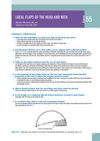 4 citations,
January 2018 in “General Physiology and Biophysics”
4 citations,
January 2018 in “General Physiology and Biophysics” The steroids allopregnanolone and allotetrahydrodeoxycorticosteron worsened absence seizures in rats.
 4 citations,
November 2016 in “Pediatric Clinics of North America”
4 citations,
November 2016 in “Pediatric Clinics of North America” The document explains the difficulty in diagnosing and treating brain diseases caused by the immune system and stresses the need for quick and accurate tests.
 4 citations,
January 2010 in “Acta dermato-venereologica”
4 citations,
January 2010 in “Acta dermato-venereologica” Low androgen levels can still cause female pattern hair loss.
[object Object]  3 citations,
February 2019 in “Journal of Cosmetic Dermatology”
3 citations,
February 2019 in “Journal of Cosmetic Dermatology” The effects of estrogen on human scalp hair growth are unclear and need more research.
 3 citations,
May 2018 in “InTech eBooks”
3 citations,
May 2018 in “InTech eBooks” Animal models, especially mice, are essential for advancing hair loss research and treatment.
 3 citations,
January 2016 in “Journal of cosmetology & trichology”
3 citations,
January 2016 in “Journal of cosmetology & trichology” Taking vitamins, minerals, and amino acids can improve hair strength and quality in people with Monilethrix.
 3 citations,
October 2007 in “Expert Review of Dermatology”
3 citations,
October 2007 in “Expert Review of Dermatology” Hair ages due to various factors and treatments like minoxidil and finasteride can help, but more research and better public awareness are needed.
 2 citations,
October 2015 in “The New England Journal of Medicine”
2 citations,
October 2015 in “The New England Journal of Medicine” The woman's surgery lowered her testosterone and improved scalp hair loss but did not change her excessive body hair.
 2 citations,
February 2024 in “Nature cell biology”
2 citations,
February 2024 in “Nature cell biology” Mechanical forces are crucial for shaping cells and forming tissues during development.
 1 citations,
September 2023 in “Dermatology and therapy”
1 citations,
September 2023 in “Dermatology and therapy” More research is needed to find the best treatment for dissecting cellulitis of the scalp.
 1 citations,
October 2022 in “Curēus”
1 citations,
October 2022 in “Curēus” Diagnosing simple-virilizing congenital adrenal hyperplasia can be difficult and requires thorough testing and expert advice.
 1 citations,
August 2020 in “Food Research”
1 citations,
August 2020 in “Food Research” Plant extracts like Avicennia marina, Boehmeria nipononivea, and Camellia sinensis could potentially treat hair loss with fewer side effects than synthetic drugs.
 1 citations,
November 2016 in “Congenital Anomalies”
1 citations,
November 2016 in “Congenital Anomalies” Get head MRI for babies with achondroplasia early, use free immunoglobulin light chains to detect certain neurodevelopmental disorders, and video calls work for speech therapy in patients with facial anomalies.
 1 citations,
March 2016 in “Neurotoxicity Research”
1 citations,
March 2016 in “Neurotoxicity Research” Finasteride may protect brain and improve behavior in rats with liver failure.
 1 citations,
November 2014
1 citations,
November 2014 The document explains hair and nail biology, common hair loss conditions and treatments, oral and genital skin diseases, and the risks and treatments associated with squamous cell carcinoma.
 1 citations,
September 2013 in “Elsevier eBooks”
1 citations,
September 2013 in “Elsevier eBooks” Hair ages and thins due to factors like inflammation and stress, and treatments like antioxidants and hormones might improve hair health.
 1 citations,
January 2010 in “Elsevier eBooks”
1 citations,
January 2010 in “Elsevier eBooks” The document concludes that local flaps are effective for reconstructive surgery in the head and neck, offering good skin match and function.
 1 citations,
January 2009 in “Elsevier eBooks”
1 citations,
January 2009 in “Elsevier eBooks” Anorexia Nervosa and Bulimia Nervosa are complex eating disorders with increasing incidence among young females, significant morbidity, and varying mortality rates, requiring more research for better treatment.
 June 2024 in “Al- Anbar Medical Journal”
June 2024 in “Al- Anbar Medical Journal” Acute telogen effluvium can be resolved by addressing causes, but chronic telogen effluvium is harder to treat.
 May 2024 in “International Journal For Multidisciplinary Research”
May 2024 in “International Journal For Multidisciplinary Research” The herbal hair cream helps protect and improve hair health.
 April 2024 in “Cell death and disease”
April 2024 in “Cell death and disease” Long COVID causes various long-term health issues and needs better awareness and treatment.
 September 2023 in “Reproductive health of woman”
September 2023 in “Reproductive health of woman” PCOS is common, affects fertility, and requires personalized treatment to manage symptoms and health risks.

Non-invasive methods can effectively diagnose and manage alopecia areata.
[object Object]  January 2023 in “International Journal of Research Publication and Reviews”
January 2023 in “International Journal of Research Publication and Reviews” Some herbal ingredients like linalool and tea tree oil have anti-dandruff properties and are safe for use in shampoos.

Researchers found a genetic link for hereditary hair loss but need more analysis to identify the exact gene.
 March 2021 in “bioRxiv (Cold Spring Harbor Laboratory)”
March 2021 in “bioRxiv (Cold Spring Harbor Laboratory)” Removing a specific gene in certain skin cells causes hair loss on the body by disrupting normal hair development.
 November 2020 in “Elsevier eBooks”
November 2020 in “Elsevier eBooks” Antiandrogens and androgen inhibitors like spironolactone, finasteride, and dutasteride can treat hair loss and skin conditions, but they have risks and side effects, including potential harm to pregnant women and risks of cancer and heart issues. Herbal remedies also have antiandrogenic effects but lack safety validation.
 January 2020 in “Cosmetics”
January 2020 in “Cosmetics” Ecklonia cava extract may protect the scalp from pollution and improve its health.
 January 2020 in “Elsevier eBooks”
January 2020 in “Elsevier eBooks” Plant-based chemicals may help hair growth and prevent hair loss but need more research to compete with current treatments.
 November 2019 in “Harper's Textbook of Pediatric Dermatology”
November 2019 in “Harper's Textbook of Pediatric Dermatology” Understanding normal hair growth and loss in children is key to diagnosing and treating hair disorders.






























